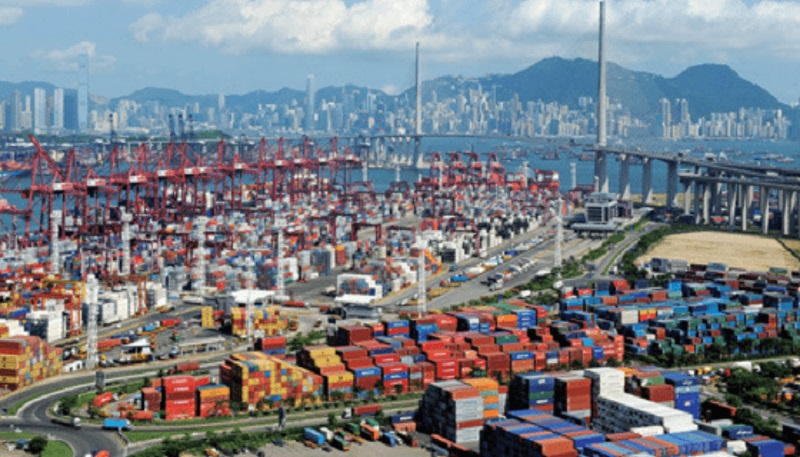Economy
Nigeria Won’t Default on Chinese Loans—DMO Assures

By Dipo Olowookere
Nigerians have been urged not to panic over the loans obtained by federal government from China recently, saying there is no risk of default on any loan.
This assurance was given by the Debt Management Office (DMO) in a statement issued yesterday to allay fears that the Chinese lenders could take over assets of the country if it fails to repay the loans.
The debt office said claims of potential seizure of national assets by Chinese lenders in some African countries have not been validated.
According to the DMO, based on need, and subject to the receipt of requisite approvals, government can raise capital from several domestic and external sources to finance capital projects, in order to promote economic growth and development, as well as, job creation.
It said regarding external borrowing, federal government accesses capital from several sources; multilaterals, such as the World Bank and the African Development Bank, as well as, bilateral loans from various countries such as France (through the Agence Francaise de Development AFD), Germany (KfW), Japan (Japan International Cooperation Agency – JICA), India (India Development Bank) and China (China Export-Import Bank–EXIM).
The debt office noted that these loans from multilateral and bilateral lenders are typically used to finance specific capital projects across the country.
It disclosed further that the international capital market is another source of capital and that one of the reasons why Nigeria would raise capital from multilateral and bilateral sources is because they are concessional which means that they are cheaper in terms of costs, and more convenient to service because they are usually of long tenors with grace periods.
“Prudent management of the public debt implies that, the government should avail itself of the opportunity to access concessional loans which deliver twin benefits of being more cost efficient and supporting infrastructural development.
“Loans from concessional lenders have limits in terms of the amounts that they can provide to each country.
“This makes it necessary for Nigeria to have several sources for accessing concessional capital to increase the total amount available and also, to avoid undue dependence on only a few sources of concessional funds.
“Borrowing from China Exim is one of such means of ensuring that Nigeria has access to more long term concessional loans. Given the country’s infrastructure deficit, which needs to be urgently addressed, the loans from China Exim, which provide financing for critical infrastructure in road and rail transport, aviation, water, agriculture and power at concessional terms, are appropriate for Nigeria’s financing needs and align properly with the country’s debt management strategy,” the statement said.
“The public should be assured that Nigeria’s public debt is being managed under statutory provisions and international best practice, and there is no risk of default on any loan, including the Chinese loans.
“Thus, the possibility of a takeover of assets by a lender does not exist. For the avoidance of doubt, the government’s borrowing in the domestic and external markets, including Chinese loans are all backed by the full faith and credit of the government, rather than a pledge of the government’s assets.
“Finally, borrowing from China should not be seen from a negative perspective as they are being used to finance Nigeria’s infrastructural development at concessional terms.
“Moreover, China Exim loans are only one of the sources of multilateral and bilateral loans accessed by Nigeria and represented only about 8.5 percent of Nigeria’s external debt as at June 30, 2018.
“Nigeria’s public debt remains sustainable and there is also no risk of default because of Nigeria’s sound debt management practices,” the agency stated.
Economy
Customs Oil and Gas Free Trade Zone in Rivers Collects N53.98bn Revenue

By Adedapo Adesanya
The Nigeria Customs Service (NCS) Oil and Gas Free Trade Zone Command in Rivers State says it has achieved a record-breaking revenue collection of N53.98 billion between January and November 2024, exceeding its annual target by 2.3 per cent and nearly doubling the N26.80 billion generated in 2023.
This was disclosed by the Customs Area Controller, Oil and Gas Free Trade Zone, Onne, Comptroller Seriki Usman, during a press briefing at the command’s headquarters, where he attributed the success to strategic collaboration with stakeholders, operational efficiency, and a focus on regulatory compliance.
He said, “A notable achievement of the command was its record-breaking revenue collection of N53.98 billion. This figure represents a 2.3 per cent increase over our annual target for 2024 and a remarkable 98.6% rise compared to the N26.80 billion collected in 2023.
“Our record-breaking revenue underscores the importance of effective trade facilitation and regulatory compliance. This achievement reflects the commitment of our officers, the collaboration with stakeholders, and the critical role of the Oil and Gas Free Trade Zone in driving Nigeria’s economic growth,” he said.
He explained that the Command successfully facilitated the export of key products such as refined sugar, fertiliser, liquefied natural gas, LNG, and crude oil from major facilities, including Bundu Sugar Refinery, Notore Chemical PLC, and Bonny Island.
“The seamless management of imports and exports within the free trade zone has enhanced operations for licensed enterprises,” he noted.
Speaking on the significance of these achievements, Comptroller Usman emphasized the need to maintain the momentum.
“This accomplishment is not just about numbers but about fostering trade growth, innovation, and creating a conducive environment for businesses to thrive within the free trade zone.”
On regulatory compliance, Comptroller Usman reassured Nigerians of the Command’s commitment to ensuring adherence to international trade regulations while fostering economic progress.
“Our focus remains on enhancing service delivery, promoting ease of doing business, and driving revenue generation that supports the nation’s development goals,” he said.
The command emphasized that collaboration with stakeholders, particularly the Oil and Gas Free Trade Zone Authority, has been pivotal in achieving these milestones, and called for continued partnership to sustain trade growth and improve service delivery.
As the year comes to a close, the command has reiterated its resolve to solidify its role as a critical revenue driver and trade facilitator in Nigeria’s oil and gas sector.
Mr Usman said the performance reflects the command’s vital role in strengthening Nigeria’s non-oil revenue base and its determination to remain a key player in the country’s economic transformation efforts.
“We remain committed to sustaining our achievements, fostering trust among stakeholders, and contributing significantly to the nation’s economic growth,” Comptroller Usman concluded.
Economy
FAAC Disburses 1.727trn to FG, States Local Councils in December 2024

By Modupe Gbadeyanka
The federal government, the 36 states of the federation and the 774 local government areas have received N1.727 trillion from the Federal Accounts Allocation Committee (FAAC) for December 2024.
The funds were disbursed to the three tiers of government from the revenue generated by the nation in November 2024.
At the December meeting of FAAC held in Abuja, it was stated that the amount distributed comprised distributable statutory revenue of N455.354 billion, distributable Value Added Tax (VAT) revenue of N585.700 billion, Electronic Money Transfer Levy (EMTL) revenue of N15.046 billion and Exchange Difference revenue of N671.392 billion.
According to a statement signed on Friday by the Director of Press and Public Relations for FAAC, Mr Bawa Mokwa, the money generated last month was about N3.143 trillion, with N103.307 billion used for cost of collection and N1.312 trillion for transfers, interventions and refunds.
It was disclosed that gross statutory revenue of N1.827 trillion was received compared with the N1.336 trillion recorded a month earlier.
The statement said gross revenue of N628.972 billion was available from VAT versus N668.291 billion in the preceding month.
The organisation stated that last month, oil and gas royalty and CET levies recorded significant increases, while excise duty, VAT, import duty, Petroleum Profit Tax (PPT), Companies Income Tax (CIT) and EMTL decreased considerably.
As for the sharing, FAAC disclosed that from the N1.727 trillion, the central government got N581.856 billion, the states received N549.792 billion, the councils took N402.553 billion, while the benefiting states got N193.291 billion as 13 per cent derivation revenue.
From the N585.700 billion VAT earnings, the national government got N87.855 billion, the states received N292.850 billion and the local councils were given N204.995 billion.
Also, from the N455.354 billion distributable statutory revenue, the federal government was given N175.690 billion, the states got N89.113 billion, the local governments had N68.702 billion, and the benefiting states received N121.849 billion as 13 per cent derivation revenue.
In addition, from the N15.046 billion EMTL revenue, FAAC shared N2.257 billion to the federal government, disbursed N7.523 billion to the states and transferred N5.266 billion to the local councils.
Further, from the N671.392 billion Exchange Difference earnings, it gave central government N316.054 billion, the states N160.306 billion, the local government areas N123.590 billion, and the oil-producing states N71.442 billion as 13 per cent derivation revenue.
Economy
Okitipupa Plc, Two Others Lift Unlisted Securities Market by 0.65%

By Adedapo Adesanya
The NASD Over-the-Counter (OTC) Securities Exchange recorded a 0.65 per cent gain on Friday, December 13, boosted by three equities admitted on the trading platform.
On the last trading session of the week, Okitipupa Plc appreciated by N2.70 to settle at N29.74 per share versus Thursday’s closing price of N27.04 per share, FrieslandCampina Wamco Nigeria Plc added N2.49 to end the session at N42.85 per unit compared with the previous day’s N40.36 per unit, and Afriland Properties Plc gained 50 Kobo to close at N16.30 per share, in contrast to the preceding session’s N15.80 per share.
Consequently, the market capitalisation added N6.89 billion to settle at N1.062 trillion compared with the preceding day’s N1.055 trillion and the NASD Unlisted Security Index (NSI) gained 19.66 points to wrap the session at 3,032.16 points compared with 3,012.50 points recorded in the previous session.
Yesterday, the volume of securities traded by investors increased by 171.6 per cent to 1.2 million units from the 447,905 units recorded a day earlier, but the value of shares traded by the market participants declined by 19.3 per cent to N2.4 million from the N3.02 million achieved a day earlier, and the number of deals went down by 14.3 per cent to 18 deals from 21 deals.
At the close of business, Geo-Fluids Plc was the most active stock by volume on a year-to-date basis with a turnover of 1.7 billion units worth N3.9 billion, followed by Okitipupa Plc with the sale of 752.2 million units valued at N7.8 billion, and Afriland Properties Plc with 297.3 million units sold for N5.3 million.
In the same vein, Aradel Holdings Plc remained the most active stock by value on a year-to-date basis with the sale of 108.7 million units for N89.2 billion, trailed by Okitipupa Plc with 752.2 million units valued at N7.8 billion, and Afriland Properties Plc with a turnover of 297.3 million units worth N5.3 billion.
-

 Feature/OPED5 years ago
Feature/OPED5 years agoDavos was Different this year
-
Travel/Tourism8 years ago
Lagos Seals Western Lodge Hotel In Ikorodu
-

 Showbiz2 years ago
Showbiz2 years agoEstranged Lover Releases Videos of Empress Njamah Bathing
-

 Banking6 years ago
Banking6 years agoSort Codes of GTBank Branches in Nigeria
-

 Economy2 years ago
Economy2 years agoSubsidy Removal: CNG at N130 Per Litre Cheaper Than Petrol—IPMAN
-

 Banking2 years ago
Banking2 years agoFirst Bank Announces Planned Downtime
-

 Sports2 years ago
Sports2 years agoHighest Paid Nigerian Footballer – How Much Do Nigerian Footballers Earn
-

 Technology4 years ago
Technology4 years agoHow To Link Your MTN, Airtel, Glo, 9mobile Lines to NIN



















